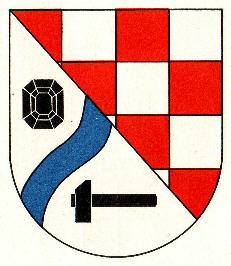Hammerstein (Idar-Oberstein): Difference between revisions
Jump to navigation
Jump to search
Knorrepoes (talk | contribs) m (Text replacement - "|'''English''' ↵| {{blazon wanted}}" to "|'''English''' | blazon wanted") |
Knorrepoes (talk | contribs) m (Text replacement - "↵{{de1}}↵{{media1}}↵↵'''Literature''': Heyen und Zimmer, 1966↵↵[[Category:" to " '''Literature''': Heyen und Zimmer, 1966 {{de1}} {{media1}} [[Category:") |
||
| Line 24: | Line 24: | ||
The arms are a combination of the checquered field of the arms of the Counts of Sponheim, to which the area historically belonged, and in the lower half a canting hammer and stone (Stein) symbolising the gemstone industry in the village. The wavy blue bar represents the Nahe river. | The arms are a combination of the checquered field of the arms of the Counts of Sponheim, to which the area historically belonged, and in the lower half a canting hammer and stone (Stein) symbolising the gemstone industry in the village. The wavy blue bar represents the Nahe river. | ||
[[Civic Heraldry Literature - Germany|'''Literature''']]: Heyen und Zimmer, 1966 | |||
{{de1}} | {{de1}} | ||
{{media1}} | {{media1}} | ||
[[Category:German Municipalities H]] | [[Category:German Municipalities H]] | ||
Revision as of 13:16, 11 July 2023
HAMMERSTEIN
State : Rheinland-Pfalz
District (Kreis) : Birkenfeld
Incorporated into: 1969 Idar-Oberstein
| German | In schräggeteiltem Schild vorne in Silber ein blauer schräglinker Wellenbalken, begleitet oben von einem schwarzen geschliffenen Edelstein, unten von einem liegenden schwarzen Hammer; hinten rot-silbern geschacht. |
| English | blazon wanted |
Origin/meaning
The arms were officially granted on July 8, 1965.
The arms are a combination of the checquered field of the arms of the Counts of Sponheim, to which the area historically belonged, and in the lower half a canting hammer and stone (Stein) symbolising the gemstone industry in the village. The wavy blue bar represents the Nahe river.
Literature: Heyen und Zimmer, 1966
